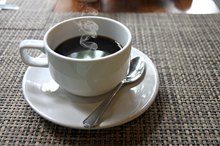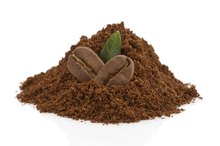Is Drinking Coffee and Taking Diazepam Harmful?
Diazepam belongs to a class of drugs called benzodiazepines. Commonly used for the relief of anxiety and in alcohol withdrawal, diazepam is also used to treat some seizure disorders, help relax muscles and relieve muscle spasms. Benzodiazepines are central nervous system depressants; they slow down the nervous system. The combination of coffee – more specifically, coffee with caffeine – with diazepam can make the diazepam less effective 2.**
Coffee and Caffeine
While you may think of coffee as simply a beverage, caffeinated coffee actually contains a psychoactive drug. Caffeine can affect your sleep, increase your blood pressure and increase your metabolic rate. It is also possible to become physiologically dependent on caffeine and to develop withdrawal symptoms if you suddenly stop drinking caffeinated coffee. It is the stimulant effect of caffeine in coffee that makes it a problem for those who take diazepam 2.
- While you may think of coffee as simply a beverage, caffeinated coffee actually contains a psychoactive drug.
- It is also possible to become physiologically dependent on caffeine and to develop withdrawal symptoms if you suddenly stop drinking caffeinated coffee.
Caffeine and Anxiety
Ephedrine Vs. Caffeine
Learn More
Coffee is a safe beverage for most people if taken in moderation, according to the “Harvard Women’s Health Watch.” However, drinking more than a few cups a day can create problems such as insomnia, increased anxiety and a jittery or shaky feeling. According to a review published in 2000 by the American College of Neuropsychopharmacology, medical specialists recommend that those who suffer from anxiety, reduce or eliminate caffeine from their diets 2.**
Caffeine and Diazepam
A study published in “Medical Biology” in 1983 examines human subjects in four controlled double-blind trials. Study participants took diazepam or a placebo capsule and then drank decaffeinated coffee, decaffeinated coffee with caffeine added or decaffeinated coffee with theophylline added. Caffeine in doses of 250 milligrams and 500 milligrams counteracted the effect of the diazepam in a number of areas tested 2. In research on rats published in a 1997 issue of “Life Sciences,” researchers found diazepam altered caffeine effects on the rats’ brains 2.
- A study published in “Medical Biology” in 1983 examines human subjects in four controlled double-blind trials.
- Caffeine in doses of 250 milligrams and 500 milligrams counteracted the effect of the diazepam in a number of areas tested 2.
Considerations and Warnings
Congestive Heart Failure & Caffeine
Learn More
Drugs.com reports that diazepam and caffeine interact, and that caffeine can cause a 22 percent reduction in diazepam drug levels 12.** Diazepam can make you dizzy or drowsy, especially if you take other medications that have similar effects. Some prescription and over-the-counter medications contain caffeine, so coffee is not the only concern when you take diazepam. You shouldn’t take diazepam if you are pregnant or breastfeeding because it could harm the baby. If you regularly drink caffeinated coffee and are prescribed diazepam, consult your doctor. You may need to switch to decaf or stop coffee entirely.
- Drugs.com reports that diazepam and caffeine interact, and that caffeine can cause a 22 percent reduction in diazepam drug levels 1.
- Diazepam can make you dizzy or drowsy, especially if you take other medications that have similar effects.
Related Articles
References
- Drugs.com: Valium
- Caffeine : A Drug of Abuse?
- Drugs.com: Valium (Diazepam) and Alcohol / Food Interactions
- Coffee, brewed, prepared with tap water. FoodData Central. U.S. Department of Agriculture. Published April 1, 2019.
- Caffiene in coffee. FoodData Central. U.S. Department of Agriculture. Published April 1, 2019.
- McCusker RR, Fuehrlein B, Goldberger BA, Gold MS, Cone EJ. Caffeine content of decaffeinated coffee. J Anal Toxicol. 2006;30(8):611-3. doi:10.1093/jat/30.8.611
- Coffee, instant, reconstituted. FoodData Central. U.S. Department of Agriculture. Published April 1, 2019.
- U.S. Department of Agriculture. Coffee, espresso. FoodData Central. Published April 1, 2019.
- Tea, hot, leaf, black. FoodData Central. U.S. Department of Agriculture. Published April 1, 2019.
- Soft drink, cola. FoodData Central. U.S. Department of Agriculture. Published April 1, 2019.
- US Food & Drug Administration. Spilling the beans: How much caffeine is too much?. Updated December 12, 2018.
- Rogers PJ, Heatherley SV, Mullings EL, Smith JE. Faster but not smarter: Effects of caffeine and caffeine withdrawal on alertness and performance. Psychopharmacology (Berl). 2013;226(2):229-40. doi:10.1007/s00213-012-2889-4
- Freedman ND, Park Y, Abnet CC, Hollenbeck AR, Sinha R. Association of coffee drinking with total and cause-specific mortality. N Engl J Med. 2012;366(20):1891-904. doi:10.1056/NEJMoa1112010
- Voskoboinik A, Kalman JM, Kistler PM. Caffeine and arrhythmias: Time to grind the data. JACC Clin Electrophysiol. 2018;4(4):425-432. doi:10.1016/j.jacep.2018.01.012
- Papakonstantinou E, Kechribari I, Sotirakoglou Κ, et al. Acute effects of coffee consumption on self-reported gastrointestinal symptoms, blood pressure and stress indices in healthy individuals. Nutr J. 2016;15:26. doi:10.1186/s12937-016-0146-0
- The American College of Obstetricians and Gynecologists. Moderate Caffeine Consumption During Pregnancy. Committee Opinion: 462. Published August 2010.
- Drake C, Roehrs T, Shambroom J, Roth T. Caffeine effects on sleep taken 0, 3, or 6 hours before going to bed. J Clin Sleep Med. 2013;9(11):1195-200. doi:10.5664/jcsm.3170
- Alstadhaug KB, Andreou AP. Caffeine and primary (migraine) headaches-friend or foe?. Front Neurol. 2019;10:1275. doi:10.3389/fneur.2019.01275
- Lara DR. Caffeine, mental health, and psychiatric disorders. J Alzheimers Dis. 2010;20 Suppl 1:S239-48. doi:10.3233/jad-2010-1378
- National Institute of Diabetes and Digestive and Kidney Diseases. Eating, diet and nutrition for GER and GERD. Updated November 2014.
- Jiwani AZ, Rhee DJ, Brauner SC, et al. Effects of caffeinated coffee consumption on intraocular pressure, ocular perfusion pressure, and ocular pulse amplitude: A randomized controlled trial. Eye (Lond). 2012;26(8):1122-30. doi:10.1038/eye.2012.113
- Mitchell DC, Knight CA, Hockenberry J, Teplansky R, Hartman TJ. Beverage caffeine intakes in the U.S. Food Chem Toxicol. 2014;63:136-42. doi:10.1016/j.fct.2013.10.042
Writer Bio
Beth Greenwood is an RN and has been a writer since 2010. She specializes in medical and health topics, as well as career articles about health care professions. Greenwood holds an Associate of Science in nursing from Shasta College.









